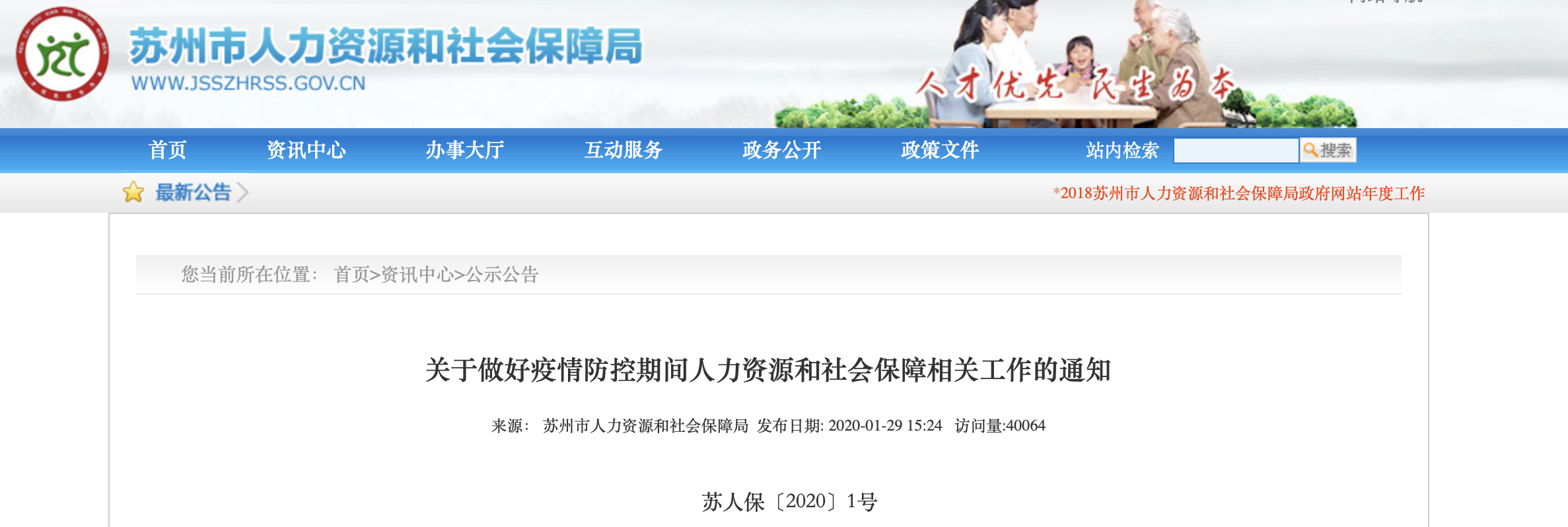

Fangben Insights
您的当前位置 : 首页>Fangben Updates>Fangben Insights

How Shall Suzhou Enterprises Pay Employees Before Feb 10, 2020?
Fangben Insights
发布日期:2020-02-06 15:28:45浏览次数: 664

I. Suzhou enterprises shall not resume work before 24:00 of February 9, 2020
The General Office of Jiangsu Provincial Government issued The Notice on Postponing Work Resumption of Enterprises on January 28, 2020, which pointed out that “All kinds of enterprises within the province shall not resume work before 24:00 on February 9th.” On January 28, 2020, Suzhou Municipal Commanding Center of Pneumoniafrom Novel Coronavirus issued its Notice of Suzhou Municipal Government on Implementing Principal Responsibility and Postponing Resumption of Work to Enhance Prevention and Control of Novel Coronavirus Pneumonia(Click on the file name to view the full text), and it pointed out that the Notice of the General Office of Jiangsu Provincial Government on Postponing Work Resumption of Enterprises (No. 20[2020]) shall be implemented and all kinds of enterprises shall not resume work before 24:00 of February 9, 2020.
Therefore, accordingto the latest notice, Suzhou enterprises shall not resume work before 24:00 of February 9, 2020.
II. Nature of thePeriod from January 31 to February 9, 2020
On January 27, 2020, the General Office of the State Council issued the "Notice on the Extension of the Spring Festival Holiday in 2020"(Click on the file name to view the full text), which did not explicitly define the nature of the extended holidays from January 31 to February 2, 2020. Fangben interprets Article 3 of the Notice as "days off" for reference. Article 5 of Notice Concerning Doing a Good Job in Terms of Human Resources and Social Security Related Work During the Epidemic Prevention and Control issued by Suzhou Municipal Human Resources and Social Security Bureau also has similar regulations.
Article 3 of Notice Concerning Doing a Good Job in Terms of Human Resources and Social Security Related Work During the Epidemic Prevention and Control (Su Ren Bao [2020] No.1) issued by Suzhou Municipal Human Resources and Social Security Bureau provides that for those employees who are unable to provide their normal labor during the government's postponing resuming work or other emergency measures, the employer shall treat them as if they provided normal labor and pay the salary. Employers meeting the requirements for normal production and operation shall perform epidemic prevention and control in accordance with provincial andmunicipal regulations. For employees who provide labor, the employer shall pay labor remuneration in full and on time, the employer is encouraged to give care and rewards in appropriate manner. If such period involving off days, it shall be implemented pursuant to relevant provision of laws and regulations.
By means of interpreting the notices of the General Office of the State Council and Suzhou Municipal Human Resources and Social Security Bureau, Fangben is of the opinion as follows:
a.The period from January 31 to February 2, 2020 is “days off” for reference.
b.As for February 3 to 9, 2020, February 3 to 7, 2020 are deemed as “working days” and February 8 and 9, 2020 are deemed as “days off”.
Compared with Shanghai Municipal Human Resources and Social Security Bureau’s unified interpretation of postponing resumption of work as “days off” on January 28, 2020, Fangben holds that the notice from Suzhou Municipal Human Resources and Social Security Bureau is more scientific and meets relevant labor law regulations, which effectively balances the current overall needs and relevant legal provisions.
III. How shall the employees get paid before resumption of work on Feb 10, 2020?
According to Article 3 of Notice Concerning Doing a Good Job in Terms of Human Resources and Social Security Related Work During the Epidemic Preventionand Control (Su Ren Bao [2020] No. 1) issued by Suzhou Municipal Human Resources and Social Security Bureau, enterprises shall pay employees as follows:
a.For those employees who do not provide their labor during the period from January 31 to February 9, 2020, their salary shall be paid normally.
b.For those employees who provide their labor during the period from February 3 to February 7, 2020, their salary shall be paid normally, and employers are encouraged to give care and rewards in an appropriate manner.
c.For those employees who provide their labor during the period from January 31 to February 2, 2020, and who provide their labor on February 8 and February 9, 2020, the enterprises shall arrange leaves or pay overtime salary according to the standard of working overtime on off days.
IV. How to deal with the suspension of business after the government’s postponing resuming work
According to the Article 4 of Notice Concerning Doing a Good Job in Terms of Human Resources and Social Security Related Work During the Epidemic Prevention and Controlissued by Suzhou Municipal Human Resources and Social Security Bureau, “after the emergency measures such as postponing resuming work taken by the government are lifted, if the employer suspends or closes its operation due to the impact of the epidemic, etc. within one payroll period (the maximum being 30 days), it shall be deemed that the employees provided normal labor and the employer shall pay the salary. If such period exceeds one payroll period, the salary may be paid based on the labor provided by the workers and according to the newly agreed standards between the two parties; if the employer has not arranged the workers to work, the workers shall be paid at least 80% of the city’s minimum wage standard.”
Fangben believes that after the government has lifted the emergency measures to postpone the resumption of work, if the enterprise is affected by the epidemic, employees' salaries shall be paid in strict accordance with Article 4 of Notice Concerning Doing a Good Job in Terms of Human Resources and Social Security Related Work During the Epidemic Prevention and Control issued by Suzhou Municipal Human Resources and Social Security Bureau.
V. How to respond to the enterprises suffering from difficulties in production and operation as a result of the impact of the epidemics after the implementation of measures of postponing resuming work by the government
Article 7 of Notice Concerning Doing a Good Job in Terms of Human Resources and Social Security Related Work During the Epidemic Prevention and Control issued by Suzhou Municipal Human Resources and Social Security Bureau provides that, if the employer has difficulty in production and operation as a result of the impact of the epidemics, it can stabilize the work post by adjusting wages, rotating shifts, shortening working hours, furloughing, etc. by consensus with the employees, and try not to lay off the employees or conduct fewer layoffs. Eligible enterprises can enjoy the policy of “return of unemployment insurance premium for steady post” in accordance with regulations. Article 8 provides that, those enterprises affected by the epidemics can apply for the implementation of the comprehensive calculation of working hours system according to its needs of production and operation, adopt measures to work for a concentrated period of time and to rest for a concentrated period of time so as to maintain normal production and operation.
Fangben believes that, for enterprises with difficulties in production and operation as a result of the impact of the epidemics, enterprises may adopt such methods as adjusting wages, rotating shifts, shortening working hours, furloughing, etc. by consensus with the employees; on the other hand, enterprises may apply to the competent labor department for the implementation of the comprehensive calculation of working hours system according to the needs of production and operation. However, both the "consensus" process and the procedure of "applying to the competent labor department" are indispensable.
VI. How to respond to the employees' failure to return to work in time after the Government's postponing resuming measures
Article 6 of Notice Concerning Doing a Good Job in Terms of Human Resources and Social Security Related Work During the Epidemic Prevention and Control issued by Suzhou Municipal Human Resources and Social Security Bureau, “After the emergency measures such as postponing resuming work taken by the government are lifted, for those employees who fail to resume work in time, the employer can give priority to consider arranging paid annual leave by consensus with the employees. Among whom, those employees who have worked cumulatively for one year but less than 10 years are entitled to enjoy 5 days of paid annual leave; those who have worked cumulatively for 10 years but less than 20 years are entitled to enjoy 10 days of paid annual leave; those who have worked cumulatively for over 20 years are entitled to enjoy 15 days of paid annual leave. Employees enjoy the same salary income during paid annual leave as during normal work period.”
Fangben believes that for the employees who could not return to work in time after the government has lifted the emergency measures for postponing resumption of work, the enterprise could give priority to consider arranging paid annual leave of the employees through consultation with the employees. If the employee does not agree to apply for paid annual leave, or the employee still cannot return to work after the paid annual leave, the enterprise can consider flexible measures such as taking days off, working at home, approving the employee's personal leave and so on, instead of terminating the employee's labor contract on the grounds of absenteeism.

